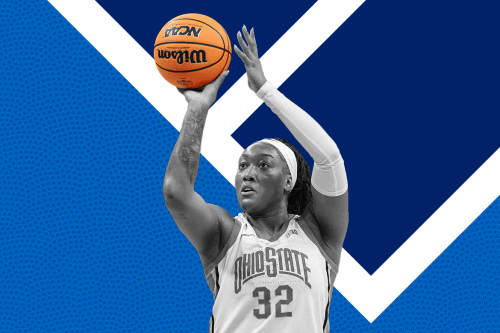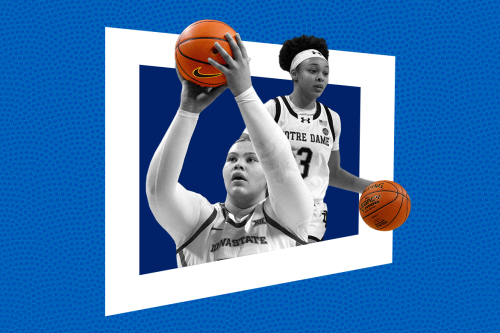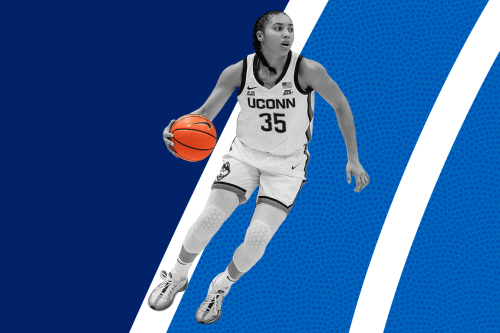Aly Raisman on why “strength” has taken on a new meaning for her this year
Olympic gymnast and activist Aly Raisman speaks about how the meaning of "strength" has changed for her since speaking out about her sexual abuse.
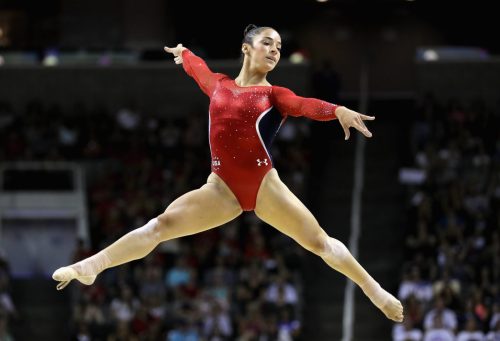
When Aerie asked gymnast Aly Raisman to identify her superpower for its latest campaign, she chose the word “strength.” At the 2012 and 2016 Olympics, the world watched Raisman show off her physical strength by helping Team USA win history-making, back-to-back gold medals. But in the past year and a half, the word has taken on an entirely new meaning in her life.
In November, 2017, Raisman came forward alongside over 160 other women to accuse her former gymnastics coach, Larry Nassar, of sexual abuse. During her 13-minute testimony at his sentencing hearing last January, she delivered a powerful message, at times looking her abuser straight in the eyes. “Abusers, your time is up. The survivors are here, standing tall, and we are not going anywhere,” she said.
And in the months since, Raisman’s made it abundantly clear that she plans to hold true to that promise. She has become an advocate and activist, sharing her story across the country and acting as a source of support for other victims of abuse. But as she told me when we sat down together at Aerie’s headquarters in New York City on the day of her campaign launch (which she stars in—un-retouched—with other badass ladies we love like Busy Philipps, Iskra Lawrence, and Cleo Wade), the only way she can be strong for others is if she prioritizes taking care of herself.
As a journalist, I know how unprofessional it is to gush about my subjects. But as a survivor of sexual assault (who only recently started thinking of herself as a “survivor” instead of a “victim,” thanks in large part to Raisman’s testimony), it feels disingenuous to write this story without acknowledging what it meant to me to sit down with Aly Raisman to talk about healing. I know that our conversation—which you’ll read below—wasn’t an easy one for her. But I also know that I, along with so many other women, are endlessly grateful for her strength, and her decision to continue to share it with the rest of us.

Well+Good: Can you elaborate on why you chose strength as your superpower, what that means to you?Aly Raisman: I feel like my whole life, I was always trying to get stronger and stronger in gymnastics. I knew gymnastics took a lot of mental strength, but it was always trying to flip higher, to be faster, to get better scores, and to do more conditioning. I think now, strength also means maybe having a day where you’re saying, ‘I don’t want to do anything today and I need to relax.’ I think strength is having the courage to really honor yourself and tell people what you need, and that can be hard sometimes.
Gold Medal Couple Tara Davis-Woodhall and Hunter Woodhall Talk Marriage, Motivation, and Their Next Chapter With Nike

Coach Kara Lawson Wants You to ‘Handle Hard Better’—and Here Are 3 Ways to Do Just That
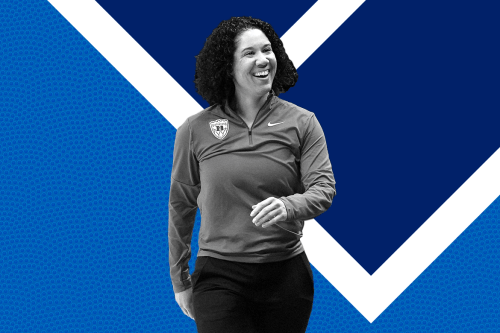
JuJu Watkins Leaves March Madness With ACL Tear—and This Knee Injury Is More Common Than You Think
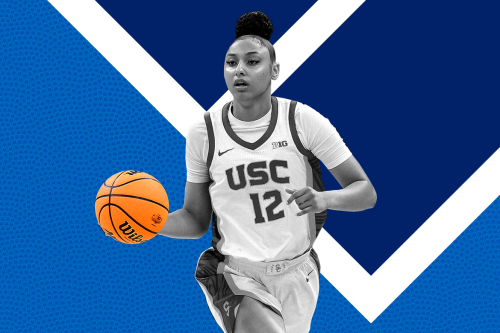
W+G: With the intensity of your training, I imagine it’s not always easy to take a break. How do you take care of yourself mentally? How do you strike a balance between pushing yourself as a gymnast and doing what you need to do for you? AR: I just launched Meditate with Aly, and I’m trying to get as many people to meditate as possible. I think that meditation has helped me in so many different ways. I used to get really bad headaches—I struggle with anxiety—and I think it’s really helped me a lot. If I’m feeling anxious, I’ll put on a guided meditation. I think self care is so crucial and so important. The last year has been very empowering, but it’s also been really exhausting and really stressful and really devastating. So for me to be able to continue to speak out, I have to take care of myself.
W+G: In addition to meditation, is there anything else that you do for yourself for self care?AR: I’m trying to do this new thing where whenever I feel myself getting anxious, I try to meditate, write in a journal, take a bath, or do a face mask. I really try to focus on understanding the root of what’s making me anxious, and [writing it out helps me do that].
W+G: From a physical standpoint, is there a particular strength-training move that you love to do at the gym? AR: In the last year, I’ve been traveling so much that I just was so exhausted, so now I’m learning how to be kinder to myself. I’ll do 10 minutes walking on the treadmill at an incline, and even that, it’s like my chest is burning and I feel so out of shape. So going from training 7 hours a day for the Olympics to being tired from walking on an incline for 10 minutes—in the beginning, I felt annoyed and frustrated that that was all I could do. But I’ve learned to be compassionate toward myself and to recognize that I’ve been through a lot and to be kind to myself.
I’ve learned to be compassionate toward myself and to recognize that I’ve been through a lot and to be kind to myself.
W+G: This mental and emotional strength that we’ve been talking about—where do you draw it from? Is there anything in particular you do to harness your strength?AR: I have a great support system. I find when I go to therapy, do self care, read self-care books, or meet other people who are really interested in taking care of themselves, I learn so much. I’m at a point right now where I’m really interested in educating myself and learning, because the more that I work on myself, the more I can share what I’ve learned with my fans. And the more work that I do for myself, the more intelligent and confident I feel. When I take care of myself, I have more strength. It doesn’t mean taking care of yourself is easy, it doesn’t mean going to therapy is fun—sometimes it can get harder before it gets better. But it’s important, at least for me, to do it.
W+G: Your activism has made such an impact in the last year and a half. What’s coming next for you and what’s coming next for your mission?AR: In the last year it’s been so amazing just to see how many people have been so supportive. But, unfortunately, seeing how many people can relate to me has also been really devastating. I’ve realized that this is not something that is going to get fixed overnight. [Sexual abuse] is such a big problem, and there’s still such a large portion of people who don’t understand why people come forward—they don’t understand that abuse is so common. So I’ve learned that I really need to take care of myself and I need to set boundaries for myself. It’s just having those quiet moments for myself that are so important.
W+G: And what does that look like?AR: I almost treat now like I did when I was training: When I was training, the food and the way that I acted outside of the gym was just as important as inside the gym. It’s the same when I speak at a college or do an interview—I’m really focused on what I’m saying and I recognize that I’m speaking on behalf of a lot of people, so I take that very seriously. Sometimes it gives me a headache because I think so much about every word that I say. If you were interviewing me about what my favorite sweater was in the Aerie collection, it would be super laid-back and easy, but talking about sexual assault and abuse is very triggering for me and it sometimes literally makes me sick, so it’s about taking time for myself and speaking up if I need a break and I can’t talk about it anymore for the day.
W+G: You have been such a source of strength and support to so, so many women. Do you have any advice for those of us who want to be strong and supportive to women in our communities?AR: A lot of times when I meet fans, they always say, ‘I wish I could make a difference, but nobody knows who I am.’ I think people think that the only way you can make change is if you’re on the cover of a magazine, or you’re doing an interview, and that’s not true. Being a leader in your community—even just sticking up or speaking out for somebody you don’t know—I think that’s really important. And to recognize that everybody can truly have an impact and can make a difference.
Just as Aly Raismn has, it’s important to come up with your own definition of what “self care” means to you. Need some ideas? Here are 22 of the small (yet effective) things that people do feel good about themselves.
Sign Up for Our Daily Newsletter
Get all the latest in wellness, trends, food, fitness, beauty, and more delivered right to your inbox.
Got it, you've been added to our email list.
